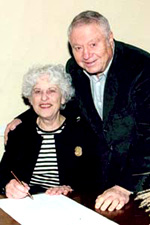Jack & Phyllis Chisvin

One of the many beautiful traditions in our faith, not widely practiced today, is that of writing an ethical will. In an ethical will parents pass on to their heirs their wisdom, a code of ethics and morality, which are as much a part of legacy as are material possessions.
In prescribing an ethical will one spells out the essential truths learned in a lifetime, evaluating what is important. An ethical will may be presented in many ways. It may be a written codicil, an oral instruction, or a lasting exemplary act. Ethical wills were first found in the Bible. On his death bed Jacob gathered his children around him and told them how they should live after he was gone. The Ten Commandments are Moses'ethical will left to the people of Israel.
An ethical will is not only consummated between parents and children, but is an enduring tie that binds generations together. It is also communal by intent. Establishing a philanthropic fund within the Jewish Foundation of Greater Toronto, in a sense, is our ethical will. While it is our hope that our children and their children will be true to this commitment,it is at the same time a testament to our parents, impoverished immigrants, who nevertheless taught us the Jewish value of tzedakah.

